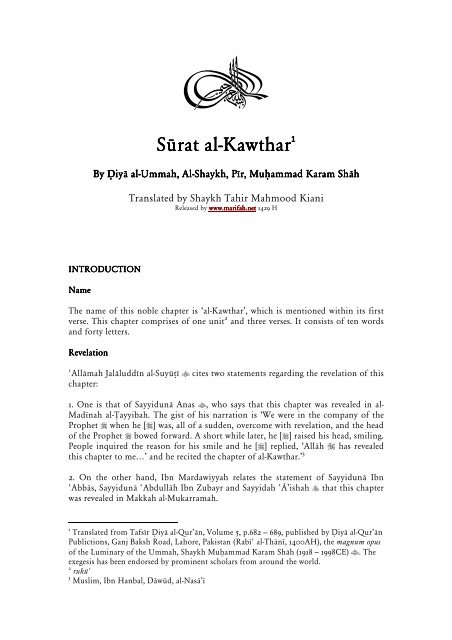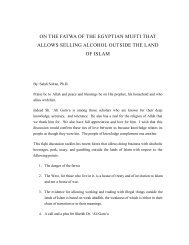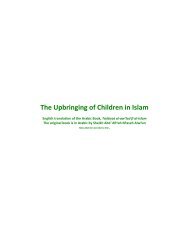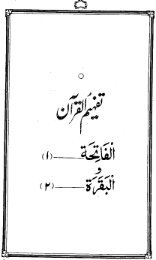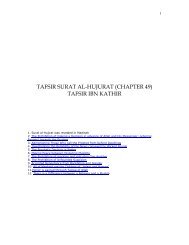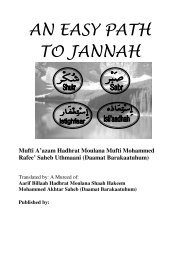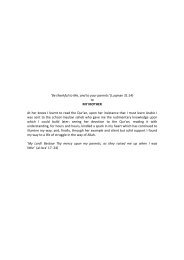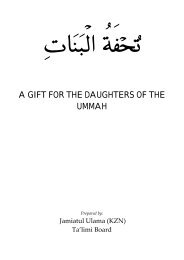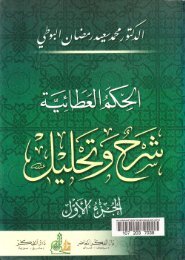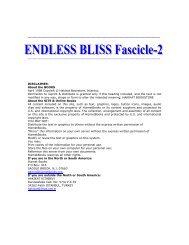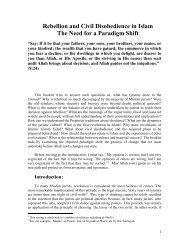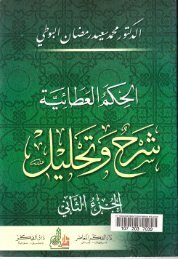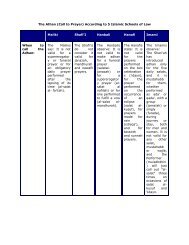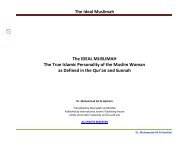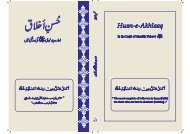Tafsir Surat al-Kawthar - The Quran Blog - Enlighten Yourself
Tafsir Surat al-Kawthar - The Quran Blog - Enlighten Yourself
Tafsir Surat al-Kawthar - The Quran Blog - Enlighten Yourself
- No tags were found...
You also want an ePaper? Increase the reach of your titles
YUMPU automatically turns print PDFs into web optimized ePapers that Google loves.
2SÙrat <strong>al</strong>-<strong>Kawthar</strong>1By ÂiyÁ <strong>al</strong>-Ummah, Al-Shaykh, PÐr, MuÎammad Karam ShÁhTranslated by Shaykh Tahir Mahmood KianiReleased by www.marifah.net 1429 HINTRODUCTIONName<strong>The</strong> name of this noble chapter is ‘<strong>al</strong>-<strong>Kawthar</strong>’, which is mentioned within its firstverse. This chapter comprises of one unit 2 and three verses. It consists of ten wordsand forty letters.RevelationÝAllÁmah J<strong>al</strong>ÁluddÐn <strong>al</strong>-SuyÙÔÐ cites two statements regarding the revelation of thischapter:1. One is that of SayyidunÁ Anas , who says that this chapter was reve<strong>al</strong>ed in <strong>al</strong>-MadÐnah <strong>al</strong>-Óayyibah. <strong>The</strong> gist of his narration is ‘We were in the company of theProphet when he [] was, <strong>al</strong>l of a sudden, overcome with revelation, and the headof the Prophet bowed forward. A short while later, he [] raised his head, smiling.People inquired the reason for his smile and he [] replied, ‘AllÁh has reve<strong>al</strong>edthis chapter to me…’ and he recited the chapter of <strong>al</strong>-<strong>Kawthar</strong>.’ 32. On the other hand, Ibn Mardawiyyah relates the statement of SayyidunÁ IbnÝAbbÁs, SayyidunÁ ÝAbdullÁh Ibn Zubayr and Sayyidah ÝÀ’ishah that this chapterwas reve<strong>al</strong>ed in Makkah <strong>al</strong>-Mukarramah.1 Translated from TafsÐr ÂiyÁ <strong>al</strong>-Qur’Án, Volume 5, p.682 – 689, published by ÂiyÁ <strong>al</strong>-Qur’ÁnPublictions, Ganj Baksh Road, Lahore, Pakistan (RabÐÝ <strong>al</strong>-ThÁnÐ, 1400AH), the magnum opusof the Luminary of the Ummah, Shaykh MuÎammad Karam ShÁh (1918 – 1998CE) . <strong>The</strong>exegesis has been endorsed by prominent scholars from around the world.2 rukÙÝ3 Muslim, Ibn Hanb<strong>al</strong>, DÁwÙd, <strong>al</strong>-NasÁ’Ð
<strong>The</strong> statements of these [latter] Senior Companions [] sh<strong>al</strong>l be preferred over thestatement of that of SayyidunÁ Anas [], that this chapter was reve<strong>al</strong>ed in Makkah<strong>al</strong>-Mukarramah, and is, therefore, a MakkÐ [chapter.] <strong>The</strong> causation of the reportingby the latter [, SayyidunÁ Anas ,] may be explained thus, that many chapters aresuch that have been reve<strong>al</strong>ed many times over. It could be that this chapter may havebeen reve<strong>al</strong>ed a second instance at this gathering behind a specific logic, and this iscorroborated by another narration of SayyidunÁ Anas [], reported by ImÁmMuslim, TirmidhÐ and other muÎaddiths 4 .<strong>The</strong> Prophet [] said:‘When I entered Paradise on the Night of the Ascension 5 , I saw thereina river - tents of pearls were fixed on either of its banks. When Ipaddled my hand in its water, the aroma of pure musk beganemanating from it. I inquired [SayyidunÁ] JibrÁ’Ðl [] regarding [thataroma] and he replied:‘hÁdhÁ <strong>al</strong>-kawthar <strong>al</strong>ladhÐ aÝÔÁka-hu AllÁh ’‘This is the River <strong>al</strong>-<strong>Kawthar</strong>, which AllÁh has bestowedupon you.’’<strong>The</strong> Ascension 6 took place in Makkah, and the tidings of being bestowed with <strong>al</strong>-<strong>Kawthar</strong> were given in that very night, and so the disclosure of this bestowmentmust <strong>al</strong>so have been made in Makkah.Moreover, [ImÁm] <strong>al</strong>-SuyÙÔÐ [] writes:‘<strong>al</strong>-mash’hÙr bayna ahl <strong>al</strong>-tafÁsÐr wa ’l-maghÁzÐ anna hÁdhihÐ ’l-sÙrahmakkiyyah’ 7‘It is common knowledge among the exegetes [of the Noble Qur’Án]and an<strong>al</strong>ysts that this chapter is MakkÐ.’Furthermore, the expression of this chapter resembles very much that of [other]MakkÐ chapters.Historic<strong>al</strong> BackgroundMother of the Believers 8 Sayyidah KhadÐjah [g] gave birth to four daughters andtwo sons of the Prophet . One son was named QÁsim and the other ÝAbdullÁh,known appellatively as Óayyib and ÓÁhir, respectively.Prior to the announcement of prophethood, the people of Makkah held the Prophet[] in high esteem. <strong>The</strong>y were expecting something noble from him. <strong>The</strong>y were so4 Masters of ÍadÐth5 Laylat <strong>al</strong>-MiÝrÁj6 MiÝrÁj7 TafsÐr <strong>al</strong>-Durr <strong>al</strong>-ManthÙr8 Umm <strong>al</strong>-Mu’minÐn
impressed by the conduct and character of the Prophet [] that they would c<strong>al</strong>l him[with the noble titles of] ‘<strong>al</strong>-ÑÁdiq’ 9 and ‘<strong>al</strong>-AmÐn’ 10 .When the Prophet [] stood atop the Mount ÑafÁ and invited <strong>al</strong>l to ‘qÙlÙ lÁ ilÁha illa’LlÁhu, tufliÎÙ (Say, ‘<strong>The</strong>re is no god but AllÁh, and you sh<strong>al</strong>l prosper)’ theircountenances changed [dramatic<strong>al</strong>ly]. <strong>The</strong>ir hearts were overwhelmed with passionsof hate, contempt and enmity. <strong>The</strong>y would be irritated with everything associatedwith the Prophet [] and everything that would be a cause of sorrow to the Prophet[], it would be a cause of pleasure to them. Thus, when both the sons of theProphet [] passed away, in succession, in their infancy, the people of Makkah werenot saddened to the slightest. In fact, they expressed satisfaction and pleasure. <strong>The</strong>dire threat which they were anticipating against their beliefs, culture and civilisationwas, to some extent, reduced. <strong>The</strong>y began to console themselves by saying thatbecause the Prophet [] has no m<strong>al</strong>e heir to continue a succession, the death of theProphet [] would <strong>al</strong>so be the end of his religion.Abtar: One who has no son is known as abtar [in the Arabic language].<strong>The</strong> insolent people from the [tribe of] Quraysh would use this very word against theBeloved [Messenger] of AllÁh []. AbÙ Lahab was, though, an uncle of the Prophet[], but the grudge and hostility against him was such that upon the death of thesecond son of the Prophet [], his happiness knew no bounds. He ran to the [other]polytheists and broke these uplifting glad tidings to them, ‘batira muÎammad <strong>al</strong>laylah(Tonight, MuÎammad has been severed [of progeny]).’ÝÀÒ ibn WÁ’il would say [as a taunt]:‘inna muÎammadan abtaru, lÁ ibna la-hÙ yaqÙmu maqÁma-hÙ baÝda-hÙ,fa-idhÁ mÁta inqaÔaÝa dhikra-hÙ, wa istarÎamtum min-hu(Indeed, MuÎammad is severed [of m<strong>al</strong>e posterity]; he has no son whowould succeed him after him. When he dies, his mention will nolonger be and you sh<strong>al</strong>l then be relieved of him).’When heart-wrenching episodes such as these exceeded their limits, and the strengthof his [] tolerance began to dwindle by their taunting and reproaching, AllÁh, theMost Generous, reve<strong>al</strong>ed this blessed chapter to His Beloved Bondsman and HolyMessenger [], which [, in itself,] explains, in an extremely brief and yet exceedinglyimpressive manner, the blissful news of limitless and uncountable bounties andblessings, over which AllÁh had rendered His Beloved [] a master, anexplanation of which is to follow.He [] declares [, to the disbelievers,] that ‘though you believe that his [] mentionsh<strong>al</strong>l be wiped out, that his name and legacy sh<strong>al</strong>l remain no more? Hark! Hark! Thisis absurd.- <strong>The</strong> grace-emitting spring of My Beloved Messenger [] sh<strong>al</strong>l flow forthforever and the world sh<strong>al</strong>l satiate itself thereby,9 the Truthful10 the Trustworthy
- the pious sh<strong>al</strong>l continuously offer their florid garlands of devotion and lovein his [] beauteous court ,- those of fervour and ze<strong>al</strong> sh<strong>al</strong>l continue to disseminate the univers<strong>al</strong>gathering with his [] remembrance,- the spiritu<strong>al</strong>ly exhilarating intonations of ‘peace and blessings [be uponhim]’ sh<strong>al</strong>l, ad infinitum, her<strong>al</strong>d the glad tidings of the Spring [of spiritu<strong>al</strong>bliss],- so long as the banner of My Grandeur continues to fly over the terrestri<strong>al</strong>and the empyrean, the remembrance of My Beloved [] sh<strong>al</strong>l persist, and thelamp which I, Myself, have kindled, it sh<strong>al</strong>l continue to emit its light despitethe fierce and violent tempests.May he perish! May the name and legacy of that individu<strong>al</strong> be wiped out, may he besevered from the root, the heart of whom is an abode to the enmity against myBeloved Prophet []’<strong>The</strong> fourteen-century-old history of Islam confirms and acknowledges this statementof AllÁh [] and this sh<strong>al</strong>l <strong>al</strong>ways continue likewise! In fact, those people [ofMakkah] experienced it themselves, when only a few years later, they became his []servants and disciples, on their own accord.That chaste and pure individu<strong>al</strong>, who emigrated from Makkah one dark night, in thestate of poverty and helplessness, the colleague of whom was none, other thanSayyidunÁ Abu Bakr <strong>al</strong>-ÑiddÐq [], he headed [back] in the direction of Makkah, anumber of years later, with an army of ten thousand, and Makkah opened up itsonce-closed gates in his [] reception, and <strong>al</strong>l the leaders of the Quraysh [ofMakkah], heads bowed, presented themselves at his [] court.One other point of interest to remember here: Wherever, in the Glorious Qur’Án, thelofty status of the Beloved Prophet, the Mercy to <strong>al</strong>l the Worlds [], has beenmentioned, there is a note of common<strong>al</strong>ity – and that is, that AllÁh has firstlymentioned Himself, and thereafter, He states the glory of His Beloved []. Forexample:‘subÎÁna ’lladhÐ asrÁ bi Ýabdi-Hi laylan…’ 11(Pure [and Glorified] is He Who took His Bondsman by night…)‘wa mÁ ars<strong>al</strong>nÁ-ka illÁ raÎmata ’lli ’lÝÁlamÐn’ 12(And We have not sent you [O’ MuÎammad ] but a mercy to <strong>al</strong>l theworlds.)Likewise, here <strong>al</strong>so [we find]:‘innÁ aÝÔaynÁ-ka ’l-kawthar’ 13(Surely, We have bestowed upon you [] <strong>al</strong>-kawthar)What is the logic behind this?11 Noble Qur’Án, 17:112 Noble Qur’Án, 21:10713 Noble Qur’Án, 108:1
As far as my humble understanding is concerned, I see two reasons behind this:1. one of them is so that, after observing the incomprehensible splendoursof the Prophet [], people do not take him [] as God, therefore, He []declares that these splendours are not his [] own, and that it is I, theLord of the Earth and the Heavens, Who have conferred them to him[],2. the second wisdom is so that no imprudent individu<strong>al</strong> would deny thesplendours of the Prophet [], because it is AllÁh Who has bestowedthem to him [], Who is Omniscient, All-Wise and All-Powerful.Whoever denies the splendours of the Messengers [], he, in re<strong>al</strong>ity, is denying thepower and wisdom, the attributes of benevolence and philanthropy of AllÁh .<strong>al</strong>-Îamdu li ’LlÁhi ’lladhÐ aÝÔÁ nabiyya-nÁ min <strong>al</strong>-mawÁhib <strong>al</strong>-sunniyyah mÁ lÁ tuÎÒÁ, wa<strong>al</strong>-maÎÁmid <strong>al</strong>-j<strong>al</strong>Ðlah mÁ lÁ tuÝadd(All praise is to AllÁh Who has bestowed our Prophet with innumerable wonderfult<strong>al</strong>ents that cannot be numbered, and with magnificent encomiums that cannot bec<strong>al</strong>culated.)الر َّ ِحي الر َّحْمَ ِن الل َّ ِه بِسْمِِم Bismi ’LlÁhi ’r-RaÎmÁni ’r-RaÎÐmIn the Name of AllÁh, the Divinely Compassionate, the Ever-Merciful.innÁ aÝÔaynÁ-ka’l-kawthar الْكَوْثَ َر َك أَعْطَيَْنا إ َّناِ1. Verily, We have bestowed upon you in abundance (whatever We have given you O’MuÎammad );fa-Ò<strong>al</strong>li li-Rabbi-ka wa ’nÎar فَصَل ِّ لِرَب ِّكَ وَانْحَرْ2. So (continue to) turn in prayer to your Lord and sacrifice (to Him only).inna shÁni’a-ka huwa ’l-abtar َلأْبتَ ُر ا َّن شَانِئَكَ هُ َو إِ3. Surely, it is your enemy (O’ MuÎammad ) who will be severed (from <strong>al</strong>l futurehope). <strong>The</strong> commendation yet continues, which had begun from the Chapter of <strong>al</strong>-ÂuÎÁ (the Glorious Morning Light) 14 , of the wonderful attributes and splendours ofthe Prophet, the Mercy for <strong>al</strong>l the Worlds .14 Noble Qur’Án, Chapter 93
AllÁh has mentioned, under various headings in the chapters in between, thosebounties and favours which He [] bestowed to either His Beloved [], or by virtueof [His Beloved ], to the followers of His Beloved Prophet MuÎammad []. Inthis chapter, He [] has synopsised <strong>al</strong>l those captions in just one word of ‘<strong>al</strong>-<strong>Kawthar</strong>’,- so that the divine verity-seeing Eye may incessantly gaze upon eachindividu<strong>al</strong> wonder of MuÎammadan beauty and inebriate itself,it may remain lost in the grace and <strong>al</strong>lurements of that embodiment ofexquisite and elegance,the heart may continuously sacrifice itself to the benevolences of thatperpetu<strong>al</strong> beauty.- Each and every expression of His [] is enlivening,each and every style of His [] is exhilarating.- When Divine Articulation describes the prestige of its Beloved [], itbegins to adopt a unique format. He [] says:‘innÁ …’ 15(Surely, We have…)<strong>The</strong> plur<strong>al</strong> pronoun [‘We’] has been used. <strong>The</strong> wording of plur<strong>al</strong>ity occasion<strong>al</strong>lydenotes profusion and amount, and it sometimes appears as an expression ofgreatness and status. Here, the objective is the latter, meaning,‘We - Who are the Creators of and Masters of the earth and sky,We - Who are the Embellishers and Illuminators of the univers<strong>al</strong> ceremony,We - the vast mat of munificence and philanthropy of Whom is forever laidspread, and is for <strong>al</strong>l an open invitation.O’ Beloved []!We have bestowed ‘<strong>al</strong>-<strong>Kawthar</strong>’ upon you. Whatsoever We may wish to give,none can prevent that, and whatsoever We have given, none can seize that.In the stead of the word ‘ÁtaynÁ ’ 16 , the word ‘aÝÔaynÁ ’ 17 is stated here. <strong>The</strong>conceptu<strong>al</strong> difference in both words is manifest. Upon researching the liter<strong>al</strong>meaning of the word ‘aÝÔÁ ’ 18 , Ibn ManÛÙr writes:‘<strong>al</strong>-iÝÔÁ’u wa’l-muÝÁÔÁtu jamÐÝan: <strong>al</strong>-munÁw<strong>al</strong>ahwa qad aÝÔÁ-hu ’l-shay’a, wa ÁÔawtu ’l-shay’a: tanÁw<strong>al</strong>at-hu bi ’l-yad ’meaning, to hand over a thing to another with one’s own hand. (lisÁn <strong>al</strong>-Ýarab)According to this research, the connotation of the verse is thus, ‘We have, with OurDivine Hand, handed over ‘<strong>al</strong>-<strong>Kawthar</strong>’ to you, We have rendered you a master overit.’ÝAllÁmah NayshÁpÙrÐ [], states in his exegesis [of the Holy Qur’Án] that there arevarious [positive] exaggerations in this verse:إن َّا 15آتينا 16أعطينا 17أعطى 18
‘min-hÁ <strong>al</strong>-taÒdÐr bi-anna, wa min-hÁ <strong>al</strong>-jamÝu ’l-mufÐdu li’l-taÝÛÐm, wamin-hÁ lafÛ <strong>al</strong>-iÝÔÁ’ dÙna <strong>al</strong>-ÐtÁ’ – wa fÐ <strong>al</strong>-iÝÔÁ’ d<strong>al</strong>Ðlu ’l-tamlÐk dÙna <strong>al</strong>-ÐtÁ’,wa min-hÁ ÒÐghat <strong>al</strong>-mÁÃÐ <strong>al</strong>-dÁllatu ÝÁlÁ <strong>al</strong>-taÎqÐq’This verse commences with the word ‘inna ’, which denotesintensification. <strong>The</strong>reafter, the pronoun of plur<strong>al</strong>ity has been used,which denotes reverence. Moreover, the word [from the infinitive]‘iÝÔÁ’ ’ 19 has been mentioned, not ‘ÐtÁ’ ’ 20 - proprietorship is found in theword ‘iÝÔÁ’ whereas this meaning is not to be found in [the latter] ‘ÐtÁ’’. Furthermore, the wording for the past tense has been used here,which indicates ascertainment, meaning, that this has <strong>al</strong>ready takenplace.ÝAllÁmah ÀlÙsÐ [] writes:‘wa fÐ isnÁd <strong>al</strong>-iÝÔÁ’i ilayhi dÙna <strong>al</strong>-ÐtÁ’i ishÁratun ilÁ anna dhÁlika ÐtÁ’unÝ<strong>al</strong>Á jihat <strong>al</strong>-tamlÐk ’Here, the ascription of ‘iÝÔÁ’ is towards the nominative pronoun,rather than of the word ‘ÐtÁ’ ’. This indicates the fact that Allah hasrendered the Prophet [] the master of ‘<strong>al</strong>-<strong>Kawthar</strong>’. Whatmagnificence of generosity and munificence of the Bestower [], andwhat high and lofty status of the recipient [].Now, an attempt to comprehend the meaning of ‘<strong>al</strong>-<strong>Kawthar</strong>’ sh<strong>al</strong>l show you theamount of the oceans of excellences and exquisites that have been contained therein:1. ÝÀllÁmah [MaÎmÙd] <strong>al</strong>-ÀlÙsÐ []states:‘<strong>al</strong>-kawthar: huwa fawÝ<strong>al</strong>un min <strong>al</strong>-kathrah, ÒÐghatun mubÁlaghah,<strong>al</strong>-shay’ <strong>al</strong>-kathÐr kathrat <strong>al</strong>-mufraÔah ’‘<strong>al</strong>-<strong>Kawthar</strong>’ is derived from ‘<strong>al</strong>-kathrah’, upon the measure of‘fawÝ<strong>al</strong>’, which itself is a noun of exaggeration. It means, ‘theabundance of a thing in such that such copiousness cannot becomprehended’. 212. ÝAllÁmah [J<strong>al</strong>ÁluddÐn] <strong>al</strong>-QurÔubÐ []writes:‘wa ’l-Ýarabu tusammÁ kullu shay’in kathÐrin fi ’l-Ýadadi wa ’l-qadriwa ’l-khaÔri kawtharan ’‘Whatsoever is huge in number, measure and significance, isc<strong>al</strong>led ‘<strong>Kawthar</strong>’ [with the Arabs].’ 22إعطاء 19إيتاء 2021 TafsÐr RÙÎ <strong>al</strong>-MaÝÁnÐ22 TafsÐr <strong>al</strong>-QurÔubÐ
One point worth considering here is that the common rule is that both the qu<strong>al</strong>ifiednoun and its attribute are mentioned together, but here, it is in opposition to that.‘<strong>al</strong>-<strong>Kawthar</strong>’ which is an attribute, is stated, but its descriptive noun is not. Whatlogic can there be behind this?Scholars say that if AllÁh had bestowed only one [particular] item to HisMessenger [] in such (limitless and immeasurable) ‘<strong>Kawthar</strong>’ , then that would havebeen mentioned; if it were a number of articles then their mention would have beenform<strong>al</strong>ly made, but the situation here is that whatsoever He [] gave, He did sowithout bound and beyond measure – what is there to mention and what is therenot. Thus, He [] states the attribute but leaves out the qu<strong>al</strong>ified noun dependanton the comprehension of the reader. In other words, ‘O’ Beloved [<strong>The</strong> bountieswhich I have bestowed upon you, they are limitless and inestimable – knowledge,serenity, generosity and benignity, in short, those nobilities which AllÁh hadattributed to His Beloved [], that is an ocean without shore, the extent of whichnone can reach.Exegetes have quoted many statements with respect to the exegesis of ‘<strong>al</strong>-<strong>Kawthar</strong>’, ofwhich the following are a few:1. <strong>Kawthar</strong> is that river of Paradise whence originate <strong>al</strong>l other rivers ofParadise, and that which AllÁh has bestowed upon His Beloved [].2. It was related by Ibn ‘Umar [] who said, that the Messenger of AllÁh said:‘<strong>al</strong>-kawtharu nahrun fi ’l-jannati ÎÁfitÁhu min dhahabin wamajrÁhu Ý<strong>al</strong>a ’l-durri wa ’l-yÁqÙt, turbatuhÙ aÔyabu mina ’l-misk,wa mÁ’u-hÙ aÎlÁ mina ’l-Ýasli wa abyaÃu mina’l-th<strong>al</strong>j.’‘<strong>The</strong> Beloved Messenger [] said that <strong>al</strong>-<strong>Kawthar</strong> is a river inParadise, its banks are of gold and its bed is of pearls andrubies, its earth is more aromatic than musk, and its water issweeter than honey and more pellucid than ice.’ 233. [<strong>Kawthar</strong>] is the name of that cistern, in the Plain of Resurrection, bywhich the Beloved Messenger [] will satiate the thirsty ones from hisUmmah. Its banks of which are laden with such a numerous amountgoblets as there are stars in the sky, so that none who is thirsty wouldhave to bear the inconvenience of waiting.MutawÁtir ÎadÐths 24 have been reported with respect to this cistern andScholars have <strong>al</strong>so stated:‘wa inna Ý<strong>al</strong>Á arkÁni-hÁ ’l-arbaÝah khulafÁ’ahu ’l-arbaÝah ’23 Muslim, TirmidhÐ24 prophetic traditions which have been reported by such a large number of people that theycannot be expected to agree, unanimously, upon a lie.
‘At its four corners his Four C<strong>al</strong>iphs [] be present.Whosoever is m<strong>al</strong>evolent to any one of them, he sh<strong>al</strong>l notreceive a single drop of <strong>al</strong>-<strong>Kawthar</strong>.’ 254. Prophethood: Prophets [], though, have come to us afore, but who isthere to comprehend the amplitude of the beneficence and the blessingsof the prophethood of MuÎammad []. <strong>The</strong> screen of [this particular]prophethood embraces <strong>al</strong>l humanity, because he [] is the Prophet to theentire universe; His [] ocean of messenger-ship is unacquainted with theboundaries of time and space.5. <strong>Kawthar</strong> denotes the Noble Qur’Án. Previous Prophets [] had <strong>al</strong>sobrought with them scriptures and books, but the comprehensiveness andperpetuance enclosed within its teachings are inimitable. No-one [else] isfortuned with the treasures that are conce<strong>al</strong>ed within this scripture ofrectitude and guidance. It is not a secret from any prudent individu<strong>al</strong>how the luminance of this explicatory book is shedding forth its light.6. [<strong>Kawthar</strong>] means that complete code of life of [known as] IslÁm.7. [<strong>Kawthar</strong>] indicates the profusion of the Noble Companions []: Noother Prophet or Messenger was blessed with as many [companions, ordisciples,] as were those of the Holy Prophet [MuÎammad] .8. [<strong>Kawthar</strong>] implies the enhancement of remembrance: No [other] exampledo we find of the manner in which the extolment of the Prophet[MuÎammad] is being made in the apexes and [in the] nadirs of thiswhole universe.9. qÁla jafar <strong>al</strong>-ÒÁdiq, Ý<strong>al</strong>ayhi wa ‘Ý<strong>al</strong>Á ÁbÁ’ihÐ ’l-kirÁm <strong>al</strong>-s<strong>al</strong>Ám, nÙru q<strong>al</strong>bi-hi’lladhÐ d<strong>al</strong>la-hÙ Ý<strong>al</strong>a ’LlÁhi taÝÁlÁ wa qaÔaÝa-hu ÝammÁ siwÁ-humeaning, that according to ImÁm JaÝfar <strong>al</strong>-ÑÁdiq, <strong>Kawthar</strong> denotes theluminance of the heart of the Prophet [], [that which] directed him []to AllÁh and severed <strong>al</strong>l ties but to Him [].10. [<strong>Kawthar</strong> is] the MaqÁm MaÎmÙd [Station of Praise and Glory]: [That is]when the Interceder for the Sinful [] will intercede on our beh<strong>al</strong>f, ingener<strong>al</strong>, on the day of resurrection.11. SayyidunÁ Ibn ÝAbbÁs [] has presented an exegesis of <strong>al</strong>-<strong>Kawthar</strong>[, inwhich he cites it as] ‘<strong>al</strong>khayr <strong>al</strong>-kathÐr ’, meaning, ‘an abundance ofgoodness’.12. SayyidunÁ SaÝÐd ibn Jubayr [] said that people state that <strong>Kawthar</strong> is thename of a river in Paradise. [SayyidunÁ Ibn ÝAbbÁs [] replied:‘huwa min <strong>al</strong>-khayr <strong>al</strong>-kathÐr ’25 Reported by <strong>al</strong>-ThaÝlabÐ in <strong>al</strong>-Kashf
‘it is a part of that abundance of goodness’. 2613. ÝAllÁmah IsmÁÝÐl <strong>al</strong>-ÍaqqÐ [] states, following his narration ofsever<strong>al</strong> sayings with regards to <strong>al</strong>-<strong>Kawthar</strong>:‘wa ’l-aÛharu anna jamÐÝa niÝam AllÁhi dÁkhilatun fi ’lkawthari,ÛÁhiratun wa bÁÔinatun. fa-min <strong>al</strong>-ÛÁhiri khayrÁt <strong>al</strong>dunyÁwa ’l-Ákhirah, wa-min <strong>al</strong>-bÁÔinati, <strong>al</strong>-ÝÙlÙm <strong>al</strong>ladunniyyah<strong>al</strong>-ÎÁÒilatu bi ’l-fayÃi ’l-ilÁhi bi-ghayri iktisÁb.’‘It is apparent that the entire bounties of AllÁh [] areenclosed within ‘<strong>al</strong>-<strong>Kawthar</strong>’, the manifest and the esoteric.Of the manifest [bounties] are the goodnesses of this worldand the Hereafter, and of the esoteric is that [divinelyinspired]mystic knowledge [which is] acquired merelythrough divine benevolence and without [person<strong>al</strong>]learning.’ 2714. ÝAllÁmah [J<strong>al</strong><strong>al</strong>uddÐn] <strong>al</strong>-QurÔubÐ [] has commented on similarlines. 2815. ÝAllÁmah [MaÎmÙd] <strong>al</strong>-ÀlÙsÐ [] says:‘inna-hu <strong>al</strong>-khayr <strong>al</strong>-kathÐr, wa ’l-niÝam <strong>al</strong>-dunyawiyyah wa ’lukhruwiyyahmin <strong>al</strong>-faÃÁ’ili wa ’l-fawÁÃili… wa-fÐ-hiishÁratun ilÁ anna mÁ ÒaÎÎa fÐ ’l-aÎÁdÐth min tafsÐri-hÐ Ò<strong>al</strong>lAllÁhu taÝÁlÁ Ý<strong>al</strong>ayhi wa-s<strong>al</strong>lam iyyÁhu bi ’l-nahri min bÁb <strong>al</strong>tamthÐliwa ’l-takhÒÐÒi li-nuktatin ’meaning, ‘<strong>Kawthar</strong> denotes ‘abundance of goodness’, aswell as the excellences and excesses of this world and theHereafter… It <strong>al</strong>so [includes] an indication to the point, ofexemplification and particularisation, mentioned in soundprophetic traditions from the explanation made by [theProphet] himself [that it is] a river. 29 Primarily, [AllÁh ] mentioned His endless bestowments which He showeredupon His Beloved []. Encouragement of being appreciative is now being made,regarding those bounties and beneficences.He [] is saying:‘O Beloved! (Continue to) establish the prayer to your Lord, andsacrifice (to Him only).’26 BukhÁrÐ27 TafsÐr RÙÎ <strong>al</strong>-BayÁn28 TafsÐr <strong>al</strong>-QurÔubÐ29 TafsÐr RÙÎ <strong>al</strong>-MaÝÁnÐ
Those of imprudence, though they eat off the dining table of Allah , thrive on themorsels of His mercy and advance in His gentle and benign embrace, they are,however, grateful to others; they worship spurious deities and offer sacrifices toidols.‘O Beloved of Mine! Emulate not this fashion of theirs as this is thegreatest form of ingratitude and deni<strong>al</strong> of favour.’<strong>The</strong> state of this repentant Bondsman and ethere<strong>al</strong> Beloved [], with respect to thecompliance of [this] statement was such that he [] would constantly stand <strong>al</strong>l nightin prayer until his feet would tumefy . Someone asked:‘O Messenger of AllÁh [], Why do you bring so much inconvenienceupon yourself?’He [] replied, ‘a-f<strong>al</strong>Á akÙna Ýabdan shakÙran ? (Sh<strong>al</strong>l I not be a gratefulbondsman (owing to the unlimited bounties) of my Lord?) ’ 30His entire life was spent in veneration and remembrance of AllÁh []. Not even amoment, of the day nor night, would be wasted in oblivion. <strong>The</strong> complete life ofthat reverend Prophet, ex<strong>al</strong>ted Guide []of whom was spent in prostrations, bows,humbleness and submission [to AllÁh ], if his ummah deprives itself of theremembrance of its Lord, their foreheads fail to emit forth the marks of prostrationsand if they are not blessed with the grace of prayer, then what can be more an illfortune than that?! shÁni’ : mubghià : In the heart of whom is m<strong>al</strong>ice and animosity, he is c<strong>al</strong>ledshÁni’ (shÁni )abtar : from the root verb batara, means <strong>al</strong>-qaÔÝ : to sever something.- With linguists, that man who has no son is known as abtar.- A quadraped lacking a tail is <strong>al</strong>so known as abtar.- Moreover, <strong>al</strong>l such action, the positive impact of which discontinues is <strong>al</strong>soc<strong>al</strong>led abtar. (<strong>al</strong>-QurÔubÐ)SayyidunÁ Ibn ÝAbbÁs [] states that these are the children born out of the womb ofLady KhadÐjah [g]:QÁsim, Zaynab, ÝAbdullÁh, Umm KulthÙm, FaÔimah and Ruqayyah Ò<strong>al</strong>l AllÁhutaÝÁlÁ Ý<strong>al</strong>Á abÐ-him wa Ý<strong>al</strong>ayhim ajmaÝÐn, respectively.It was QÁsim whose death took place first, then ÝAbdullÁh (the appellative names ofwhom are Óayyib and ÓÁhir) left with a stain of separation.Subsequent to the prophet’s announcement of prophethood, <strong>al</strong>l of the residents ofMakkah had become enemies. When the saw that both of his [] sons have passed30 Agreed upon (Bukhari, Muslim)
[virtue of] his intercession, O Lord of the Worlds, O Most Benign of thosePetitioned.M


